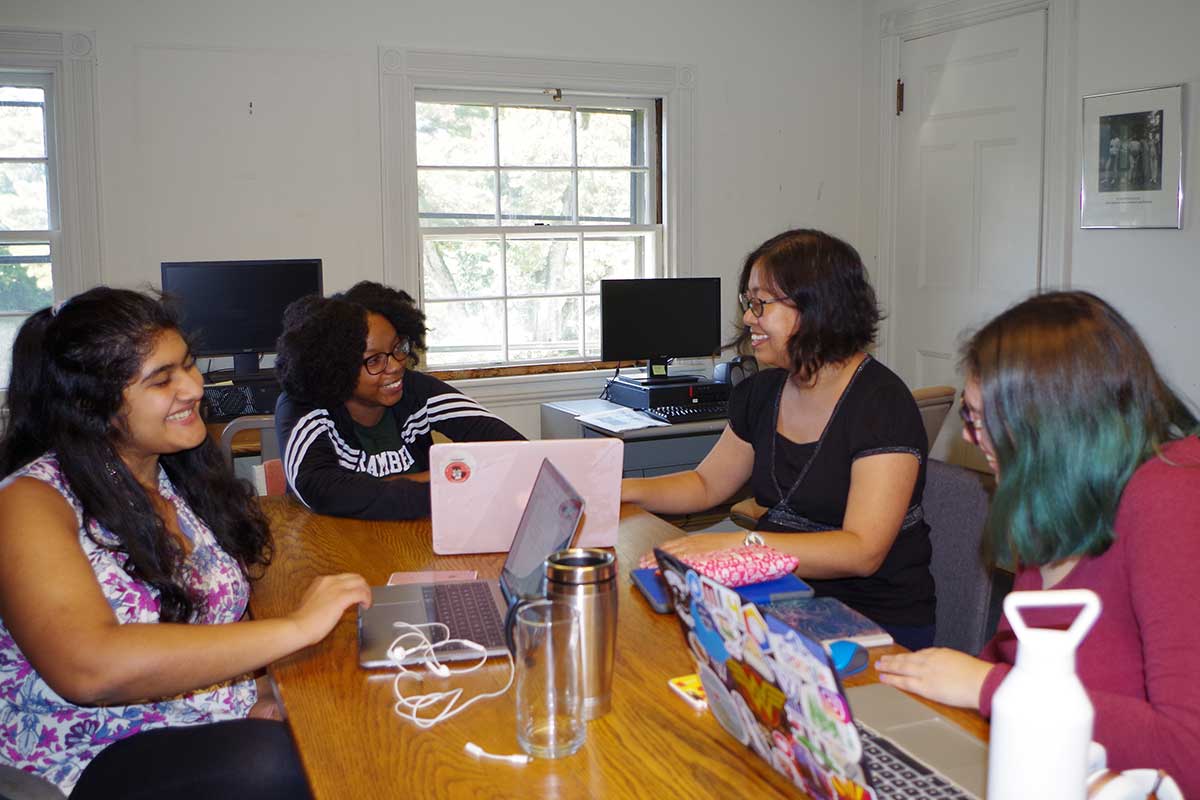 Dr. Linda Charmaraman (center, right) meets with student researchers (from left to right) Sabina Unni '19, Stephanie Cobas '21, and Cynthia Serrano Najera '21
Dr. Linda Charmaraman (center, right) meets with student researchers (from left to right) Sabina Unni '19, Stephanie Cobas '21, and Cynthia Serrano Najera '21
The Eunice Kennedy Shriver National Institute Of Child Health & Human Development of the National Institutes of Health (NIH) awarded the Wellesley Centers for Women (WCW) $450,000 over three years to study social media use of early adolescents while providing Wellesley College students with hands-on research opportunities. The longitudinal, multi-method study will investigate associations between middle school students’ social media use and health implications, as well as the roles of peer influence and parental monitoring.
Most social media platforms require users to be at least 13 years old, yet a 2010 study by the Pew Research Center found that 38 percent of 9-12 year-olds have social media accounts. Linda Charmaraman, Ph.D., research scientist at WCW and principal investigator of the newly-funded NIH study, estimates that number may be higher now. In a recent pilot study she conducted on middle school student social media use, she found that in her sample, 68 percent of students aged 12 and under already had social media accounts.
Despite the growing number of early teens using social media, prior research published by institutions like the American Academy of Pediatrics focused primarily on older teens. Little is known about risks for younger users in early adolescence when social media use typically starts.
“These early adolescents are at a particularly vulnerable point in their lives when their primary developmental tasks are to develop their own identities apart from their families and to belong to peer groups. We need to better understand the specific behavioral and psychosocial risks they face when using social media at such a young age. Our study aims to address these very urgent questions by focusing on adolescents aged 10 to 15,” said Dr. Charmaraman.
Undergraduates are Central to Research Process
Undergraduate students from Wellesley College will be central to the research process, a key focus of the NIH funding. The award, given through the R15 mechanism, is meant to expose undergraduate or graduate students to hands-on research and support the research environment of schools like Wellesley College that have not been major recipients of NIH support in the past, according to its website. This is the first R15 awarded to Wellesley College for social science research.
“Student mentorship is one of the most fundamental aspects of our work at WCW. We are thrilled that Dr. Charmaraman will continue our work in developing the next generation of researchers with this support from the National Institutes of Health,” said Layli Maparyan, Ph.D., the Katherine Stone Kaufmann '67 Executive Director of WCW.
Dr. Charmaraman makes mentorship a central part of her work. She has invited students to present their work during the WCW Lunchtime Seminar Series, co-authored book chapters and journal articles with student researchers, and presented posters at professional association conferences alongside students. Since joining the Centers in 2006 she has worked with about twenty Wellesley College students.
“Mentoring students has always been a passion of mine. Students bring fresh insights and valuable perspectives to every step of researching younger adolescents, particularly in the fast-moving world of networked media, and it’s a wonderful opportunity to help students follow their intellectual passions,” said Dr. Charmaraman.
Dr. Charmaraman is currently working with a handful of students on a mixed methods pilot study of middle schoolers’ social media use funded by Children and Screens: Institute of Digital Media and Child Development. Wellesley College student assistants currently working with Dr. Charmaraman, including Stephanie Cobas ’21, Cynthia Serrano Najera ’21, Sabina Unni ’19, and Olaide Sode ’19 will present research findings from the pilot study during a Lunchtime Seminar hosted by WCW on Thursday, October 25.
Serrano Najera spoke very highly of her experience working with Dr. Charmaraman: “I had never done research before and Dr. Charmaraman went above and beyond to make me feel like I could do it,” said Serrano Najera, “She allows us to have a lot of input in the research process and makes it feel like you’re part of something important.”
The undergraduate student researchers involved in the NIH-funded study will assist in conducting surveys of over 800 middle school students, surveying a subsample of parents, and interviewing a subsample of middle school students. Analysis of those surveys and interviews will investigate demographics associated with early social media use, how social media use is related to psychosocial issues like depression or anxiety and behavioral outcomes like sleep, physical activity, substance use, or problematic internet behaviors, and the influence of parents and peers.
“Our goal is to inform how policymakers, educators, pediatricians, and families can address social media use and the ways it contributes to both positive and negative psychosocial and behavioral health outcomes in this understudied segment of the population,” said Dr. Charmaraman.
This research project is supported by the Eunice Kennedy Shriver National Institute Of Child Health & Human Development of the National Institutes of Health under Award Number R15HD094281. The content is solely the responsibility of the authors and does not necessarily represent the official views of the National Institutes of Health.
October 17, 2018

